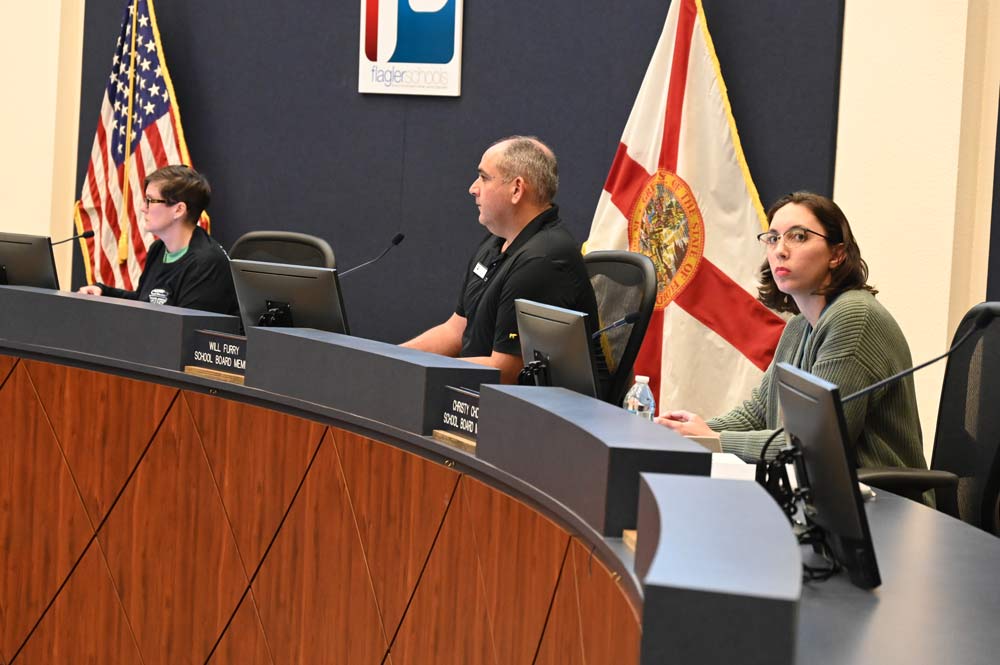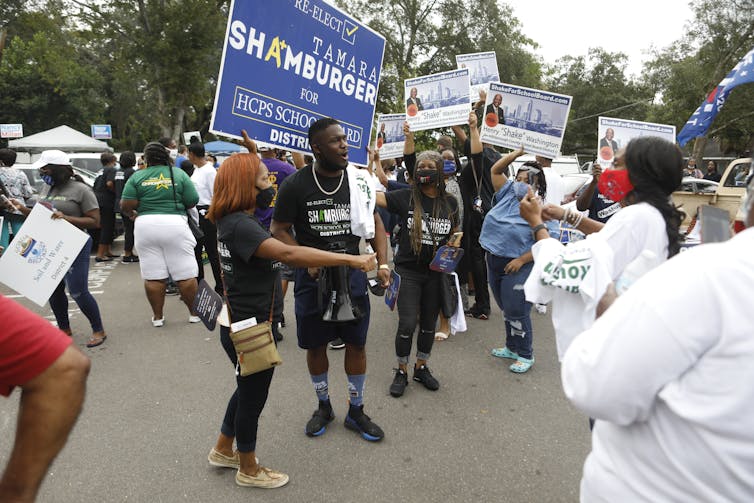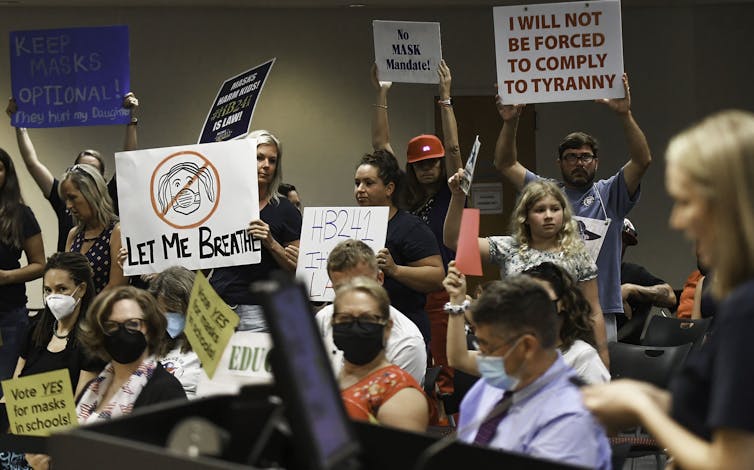
By Kathleen Knight Abowitz
In more than 90% of U.S. public school districts, school board elections are nonpartisan and have been for centuries. But that long tradition may well be changing – and putting at risk the quality of the country’s education system by introducing divisive national political issues into the process by which a local community governs itself.
At present, nine states have passed legislation that enables school board races to be partisan. Four states provide for board elections that have partisan affiliations listed on the ballot; another five states permit districts to choose nonpartisan or partisan races. Bills introduced in six states in 2023 would require or permit school board candidates to declare party affiliations on the ballot.
In 2024, lawmakers in Iowa, New Hampshire and Arizona introduced similar bills. Neither Iowa’s nor New Hampshire’s bill has yet been voted on, and Arizona’s bill was vetoed by the governor. Floridians will decide on partisan school board elections at the ballot box in November 2024.
The sponsor of the 2023 bill in Ohio, which has not yet passed, said partisan elections provide voters with better “information about candidate platforms.”
As a former school board member in Ohio and a scholar of educational leadership, I see this shift having the potential to disrupt the important work of nonpartisan school boards in communities across the nation.

Octavio Jones/Getty Images
Party membership as shorthand
Sponsors of bills proposing partisan school board elections argue that these changes will result in more voter interest and informed participation in board elections. But research indicates the real effect may be less about public participation and more about partisan conflict.
In most states, school board races are held “off cycle,” meaning not in conjunction with federal elections, when there’s less competition or voter interest — 53% of the races in 2023 were uncontested, and low turnout is the norm.
Since the COVID-19 pandemic, the nation has paid more attention to the work of public school boards. The result has been that local school board elections more frequently involve donors and educational issues more national than local in their scope.
A study of five urban districts around the nation analyzed school board elections and donation patterns starting in the 2010s. It found that in the 2012 and 2013 election cycles, large donations from people outside the school district comprised 44% of all funds contributed by individuals in those elections. Most of these donors were founders or board members of educational organizations, including charter school networks, which often compete with public schools.
In another sign of the nationalization of school board races, governors have more frequently begun endorsing school board candidates. In 2023, 31 state executive officials or candidates made endorsements for school board candidates.
A recent study of 2022 Wisconsin school board elections adds further evidence that national party conflicts can influence school board races. Researchers examined school board races in districts where one or more candidates campaigned around national culture-war themes like teaching about race and racism, responding to the COVID-19 pandemic, and sex and gender issues – including curriculum materials, sports teams and bathrooms.
The study found that areas with larger shares of Donald Trump voters in the 2020 presidential election were more likely to have a school board election with at least one candidate declaring a public position on one of these key divisive national issues.
The study also demonstrated that candidates who focused on divisive issues were more likely to win races in heavily Republican areas. This suggests that national party affiliation and ideology, more than issues facing actual school districts, were driving school board election outcomes in Wisconsin during the 2022 election cycle.

Paul Hennessy/SOPA Images/LightRocket via Getty Images
What school boards really do
Across the U.S., school boards are locally elected groups of citizens charged with crafting policy and approving budgets for districts of widely varying sizes and contexts.
School boards set the vision for education in the district; they decide how best to spend taxpayer money to educate students; and they hire and supervise superintendents and treasurers. They are not meant to intervene in day-to-day decisions such as hiring and firing of teachers, or choosing which books or other materials are used to teach lessons.
Governing local public schools requires high-quality deliberation. The quality of decisions a board can make depends on the degree to which members can collaborate productively with one another, and with district administrators, parents and others in the community.
Local school governance is at its best, research has found, when conditions for deliberative rather than adversarial decision-making prevail. Effective school boards are able to collaborate, create shared goals and focus on policies to improve student achievement and well-being. Most challenges that boards face are nonpartisan in nature: They relate to issues of policymaking, budgeting matters and the supervision of the district superintendent and treasurer.
The effects of partisanship
School board members motivated by partisan affiliation or ideology may find it difficult to put party politics aside to prioritize student interests and the local challenges that districts face.
While there has been little research on how partisan races affect the quality of school board governance and deliberations, a relevant study from 2017 sheds some light. The research used surveys of school board members in North Carolina and Georgia, where partisan races are permitted. It found a predictable partisan split: “Reminding school board members of each political party’s position on a particular issue affects board member opinions more directly if they are elected in partisan contests.”
This finding indicates that partisan elections for school board members could make members more adversarial, and therefore reduce the quality of the board’s decision-making. Rather than evaluating ideas based on research and student outcomes, board members may find themselves embroiled in partisan conflict.
Districts lose the trust of voters, including parents, when school boards are plagued by conflict, in-fighting and the inability to productively collaborate. Increased conflict on boards also makes it less likely that other citizens will volunteer to run for an open school board seat in that district.
Making school board races partisan may end up boosting low voter turnout, but it risks making the boards’ members – and local schools – more polarized and less effective.
![]()
Kathleen Knight Abowitz is Professor of Educational Leadership at Miami University.





























JC says
So voting no on Amendment 1 in Nov. I don’t want the process of making people go from School Board to a State House/Senate and other elected seats too common. Not everyone wants to be a career politician.
Laurel says
Well, we’ve seen just how poorly the Flagler County School Board has preformed with its partisan, culture war behavior, haven’t we? It’s been a disaster!
The Heritage Foundation’s Project 2025 is behind planting far right partisan school board members, and they will continue to do so. They have big ideas about how our children should be educated, such as DeSantis’ White *Christian* Nationalism idealism of “”…deleting a list of terms starting with “sexual orientation and gender identity” as well as “diversity, equity and inclusion,” “reproductive rights,” and a host of similar terms.”” (Forbes) They call this “parental rights.”
“”Roberts [Heritage Foundation] also calls for the criminalization of pornography and the imprisonment of any person who produce and distribute it; “Educators and public librarians who purvey it should be classed as registered sex offenders.” No specific definition of pornography is included.”” – Forbes. It will be defined as the Heritage Foundation sees fit, for all of us.
If Trump is elected, your children will learn only what the Heritage Foundation wants them to learn. This will be referred to as “freedom.” Even though Trump claims to not know about the Heritage Foundation, he has spoke in front of them acknowledging their plan.
Y’all better wake up and take this seriously.
Sherry says
@ Laurel, Couldn’t agree more!!! Project 2025 is being adopted by the new extreme right Republican party across the board! It goes far beyond trump! It’s a playbook for the roll out of Fascism at all levels of government across our entire country. The revolution of the Maga Cult of the ignorant is in process, undermining and rotting our democratic processes from within! Indoctrination has been happening on FOX for over 20 years, and the mindless cult righteous are taking their places in school boards, city councils, county commissions and state houses across the country for many years. Putting trump back in the Presidency is the culmination of the dreams of the founders of Project 2025, not the beginning.
“Ya’ll better wake up and take this seriously”. . . Laurel speaks the truth! Vote To Save Our Democracy! Vote to Save Our way of Life! Vote to Save Our Freedom! VOTE DEMOCRATIC!!!
Joe D says
VERY interesting article…maybe Flagler County’s School Board should review it…..instead of wasting taxpayers’ money and time with all the small minded bickering that has been happening for the last 2 years!
Tired of it says
Flagler County’s School Board is the perfect example of what happens when politics take precedence over qualifications and competency.
Another Concerned Taxpayer !!! says
Making school board elections partisan will only introduce another avenue to abusing the unethical write-in loophole, closing elections to the majority and allowing only registered Republicans or in some areas, only registered Democrats. As a NPA voter, it takes away my voice and rights in school districts. My tax dollars go toward these schools and I and all voters/taxpayers should have some say in how our tax dollars are spent. In a related area, I am opposed to my tax dollars being diverted from the public schools, to private, for-profit and religious schools, which ends up causing increases in property taxes, to offset the stolen monies which have been diverted,
Deborah Coffey says
I heartily disagree. In our current environment and the threat of Project 2025, it’s more important than ever to have all partisan races. There is no way, I would ever put another MAGA on our school board when we got banned books, our very competent superintendent let go, the demeaning of teachers, and corruption. We’re trying to save democracy…bad enough that the governor has put his Fascist hand on our schools, dictating curriculum, ridding them of DEI, sending good teachers running and putting unqualified vets in our classrooms. No, before filling in a bubble next to a school board candidate, I would need to know if that person supports a party that believes in democracy…or not.
Common Sense says
Here, you don’t have a choice: you don’t get to tell people where to go. Not your call. Not your business. Follow our comment policy.—FL
You have choice. Move to California where they have taken the parents rights away. Certain books are not appropriate in the schools. You want your sex books put them in the public library.
SS says
When voting for school board members we should be basing it on qualities like those below, not their party affiliation.
* Commitment to Public Education – A school board representative should demonstrate a strong dedication to improving and supporting public education in their community.
* Collaborative Leadership – Effective school board members work collaboratively with other board members, school administrators, teachers, parents, and community stakeholders to foster a positive educational environment.
* Understanding of Educational Issues – A deep understanding of educational issues, including curriculum development, teacher support, student achievement, and budget management, is crucial for making informed decisions.
Another commenter said “Flagler County’s School Board is a perfect example of what happens when politics takes precedence over qualifications and competency”. I could not agree more. When you look at the qualifications above, I challenge you to find a more qualified candidate than Janie Ruddy. She is exactly what our School Board needs.
TMS says
Nonpartisan races are based on the idea of civic efficacy. The elections for an official who will be holding the reins for our student’s academic education should remain nonpartisan and inclusive of all stakeholders.
However, when a governor can endorse school board members in local races that clearly makes it a partisan race.
The Flagler County School Board is the caretaker of our public education. As a community we can agree that a strong equitable public education is essential for not only our students but the viability of our community. More importantly than hearing what candidates plan to do, is identifying their motivation for seeking the seat. If their motivation and vision is not to provide and safeguard an equitable relevant education for all of our students; then, I have concerns.
Our Public School System is an investment in our children, our community and our future citizenry.The Flagler County school board does not exist to provide ambitious individuals a training ground, waiting room or stepping stone for their next political ambition. Simply “Do not use our school board in which to cut your political teeth ”
Perhaps there are those seeking to secure a school board seat, not to move Flagler Schools forward but in fact to prevent the school district from making decisions that interfere with political agendas and the selfish goals of special interests.
As an educated citizenry, we are called to look beyond the R and the D to the motivation of and influences on candidates seeking to serve on our school board.